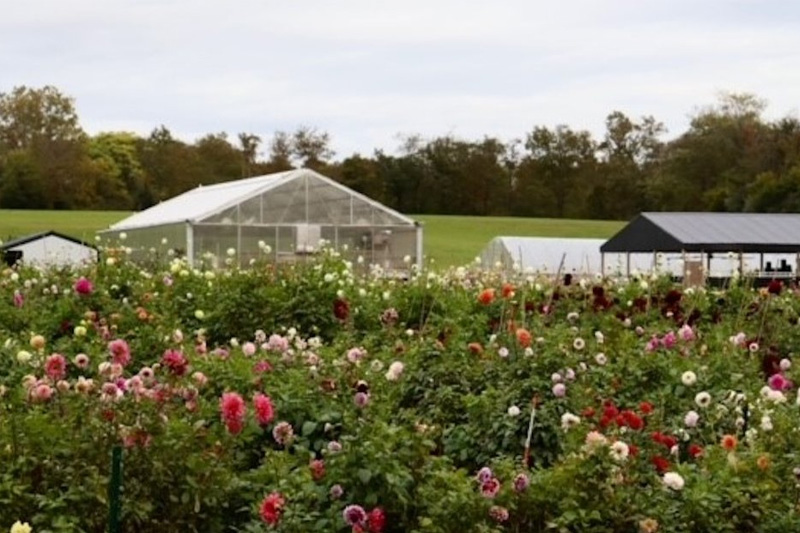
Floriculture is a lucrative, international industry that involves the cultivation, production and management of flowers. Tom Precht, Ph.D., and Sarah Daken, research scientist and attorney, pivoted the hustle of climbing the corporate ladder to establishing Grateful Gardeners in 2018 – a flower farm based in Poolesville, Maryland, just inside the Montgomery County Agricultural Reserve. Precht and Daken’s desire to foster change in the floral industry is evident in the foundational tenet of their business model — to grow organically, eliminating the use of herbicides and pesticides, and to be regenerative about the use of soil to ensure positive impacts on the environment and the planet.
What makes Grateful Gardeners’ business model so unique is its innovative technology system in which crops are cultivated – aquaponics. Aquaponics is a food production system that mimics a natural ecosystem; the system combines aquaculture with hydroponics to produce nutrient-rich aqua-culture water.
“The intricacy of the aquaponics system is balancing the nutrients in the system,” Precht said. “The nuance is ensuring that the waste/nutrients produced by the fish are balanced with the correct amount of plants in the system, to ensure the plants absorb the correct number of nutrients to grow in a healthy way.”
What started as a DIY project in the garage, turned into an innovative business plan with the potential to change the trajectory of the floriculture industry.
Getting started
According to Precht and Daken, two major companies supported their initial journey, providing a plethora of resources to get the infrastructure of the business in place. The Maryland Agricultural & Resource Based-Industry Development Corporation (MARBIDCO), provided a state-funded Land Acquisition Grant to small and family-owned farming businesses. Additionally, Horizon Farm Credit, an agricultural lending company, provided financing to support Grateful Gardeners’ agribusiness needs.
While these sources of funding played an integral role in helping Precht and Daken establish the business and infrastructure, the business owners knew an added layer of financial support was needed to unlock the next phase of the floral farming business. The co-founders sought out TEDCO’s Agriculture and Rural Rebuild (ARR) Challenge to get further support to expand the infrastructure and scale the business.
The ARR Challenge launched in early 2021 to support rural and agricultural businesses in Maryland affected by the ongoing pandemic and economic downturn. Grants of up to $200,000 were awarded to give Maryland’s agriculture economy a much-needed boost and facilitate the development of long-lasting technological improvements in the ag-tech field and other rural industries.
“TEDCO changed the game for us. They unlocked the first phase by giving us the first step to purchasing the greenhouse and the aquaponics system and allowed us to get our vision off the ground,” said Precht. “The business expanded from one acre to 34 acres of land, resulting in the growth of a variety of crops, and scaling business revenue three times in one year. Our goal is to optimize the system to try and produce as many stems as possible out of the greenhouse and aquaponics system.”
“The exploration and expansion of this innovative aquaponics technology system is a testament to the impact the ARR grant continues to have on Maryland’s ag-tech industry,” said Troy LeMaile-Stovall, CEO of TEDCO. “It is our hope that the seven ARR grant awardees continue to thrive and innovate, supporting the growth and development of Maryland’s ecosystem.”
A leap of faith in floriculture
The Grateful Gardeners’ innovative technology is currently in the research and development phase, but the co-founders continue to look towards the future.
“While a 30-by-60-foot greenhouse is a significant amount of space to house a good number of plants, expanding the business will require multiple acres of greenhouse,” said Precht. “The goal is to scale the aquaponics technology up to multiple greenhouses to grow a variety of crop.”
Grateful Gardeners’ latest focal point for crop reproduction is the Lisianthus (Eustoma) plant. Lisianthus mimic the shape and size of roses, as well as an array of beautiful color. Precht explains where normal flowers would have a five-day life span, Lisianthus are capable of spanning up to two weeks.
“This two-week life span will prove to be an invaluable resource to retail consumers and farmers’ market customers as well as prove to be profitable as there is a high price per stem,” said Precht.
The business owners also acknowledge the implications floriculture has on the environment. Precht shares “most people don’t realize that 90% of the flowers sold in the United States are imported from overseas, mainly the South American region. Consequently, this results in a massive carbon footprint for a relatively small industry. With the support of additional funding, Grateful Gardeners would be the local supplier for the Washington metropolitan area, potentially expanding to hubs in prominent areas within a 100-mile radius, ultimately creating a massive and sustainable floricultural system.”
Precht and Daken look forward to exploring other investment opportunities with TEDCO, who offers a multitude of diverse streams of investment capital.
“Entrepreneurship requires a level of courage to forge ahead even when you don’t know what the outcome is going to be. The greater good that could come of this technology is that it could change different components of our current climate crisis,” Daken said. “[Afterall,] the agricultural industry is the top polluter-behind fossil fuels [and] that requires swift and bold change.”
Source: The Business Journal